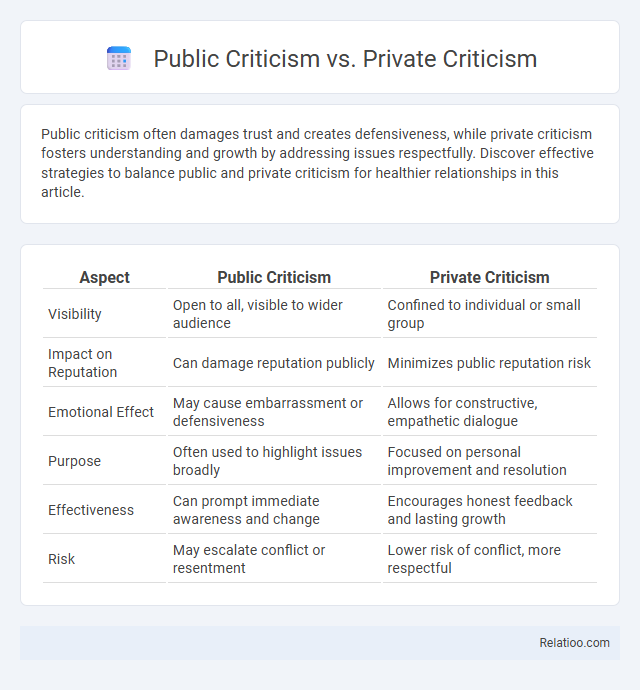Public criticism often damages trust and creates defensiveness, while private criticism fosters understanding and growth by addressing issues respectfully. Discover effective strategies to balance public and private criticism for healthier relationships in this article.
Table of Comparison
| Aspect | Public Criticism | Private Criticism |
|---|---|---|
| Visibility | Open to all, visible to wider audience | Confined to individual or small group |
| Impact on Reputation | Can damage reputation publicly | Minimizes public reputation risk |
| Emotional Effect | May cause embarrassment or defensiveness | Allows for constructive, empathetic dialogue |
| Purpose | Often used to highlight issues broadly | Focused on personal improvement and resolution |
| Effectiveness | Can prompt immediate awareness and change | Encourages honest feedback and lasting growth |
| Risk | May escalate conflict or resentment | Lower risk of conflict, more respectful |
Understanding Public Criticism
Public criticism involves openly addressing issues in a way visible to others, impacting reputation and accountability. Understanding public criticism helps you navigate social dynamics and fosters transparency by encouraging constructive feedback. Unlike private criticism, which is discreet and personal, public criticism often prompts collective reflection and broader change.
Defining Private Criticism
Private criticism involves providing feedback directly and confidentially to an individual, aiming to address issues without causing public embarrassment. Your approach in private criticism fosters a more constructive and respectful environment, encouraging openness and personal growth. Public criticism, by contrast, occurs openly and may affect reputation or morale, while general criticism refers broadly to any evaluative feedback.
Key Differences Between Public and Private Criticism
Public criticism occurs openly, often in social or professional settings, making the feedback visible to others, which can impact reputations and group dynamics. Private criticism is delivered confidentially, fostering a safer environment for honest dialogue and personal growth without external judgment. The key difference lies in confidentiality and context, where public criticism influences wider perceptions, while private criticism targets individual improvement discreetly.
Psychological Impact of Public Criticism
Public criticism can significantly affect your psychological well-being by increasing feelings of embarrassment, anxiety, and lowered self-esteem compared to private criticism. Private criticism often allows for a safer and more constructive environment, promoting growth without the added pressure of social judgment. Understanding the impact of public criticism helps in managing emotional responses and fostering resilience in social and professional settings.
Effects of Private Criticism on Individuals
Private criticism often fosters a safer environment for individuals to receive feedback, promoting self-reflection and growth without the pressure of public judgment. It reduces feelings of embarrassment and defensiveness, thereby enhancing receptiveness and motivation to improve. In contrast to public criticism, private feedback is more likely to strengthen relationships and encourage constructive dialogue.
When to Use Public Criticism
Public criticism is most effective when addressing behaviors or decisions that impact a wide audience or require transparency to foster accountability, such as organizational policies or public conduct of officials. It encourages collective awareness and prompts systemic change by engaging community or organizational members in dialogue. Hold public criticism for situations where private feedback might overlook patterns or fail to address broader issues needing collective recognition.
Appropriate Situations for Private Criticism
Private criticism is most effective when addressing sensitive issues that require discretion to avoid embarrassment or conflict. Your feedback delivered in a private setting fosters a more constructive and open dialogue, enhancing trust and understanding. This approach is ideal for personal development, resolving misunderstandings, or guiding behavioral changes without public scrutiny.
Benefits and Drawbacks of Public Criticism
Public criticism provides immediate visibility and accountability, helping to address issues swiftly and promote transparency in organizations or communities. However, it can lead to embarrassment, defensiveness, or damage to relationships, making it less effective in fostering constructive change compared to private criticism. Understanding when to use public criticism versus private criticism allows you to balance openness with sensitivity, maximizing the benefits of feedback while minimizing potential harm.
Advantages and Disadvantages of Private Criticism
Private criticism allows for honest feedback without public embarrassment, fostering personal growth and maintaining workplace harmony. However, it may limit diverse perspectives and reduce accountability compared to public criticism. You benefit from a more respectful environment, but it requires careful handling to ensure the feedback is constructive and not perceived as secretive or unfair.
Best Practices for Delivering Constructive Feedback
Public criticism can undermine trust and morale, making private criticism a more effective approach for fostering improvement and maintaining positive relationships. Delivering constructive feedback requires clarity, specificity, and a focus on behaviors rather than personal attributes to encourage growth and accountability. Combining empathy with actionable suggestions ensures that criticism is received as an opportunity for development rather than as a personal attack.

Infographic: Public Criticism vs Private Criticism
 relatioo.com
relatioo.com